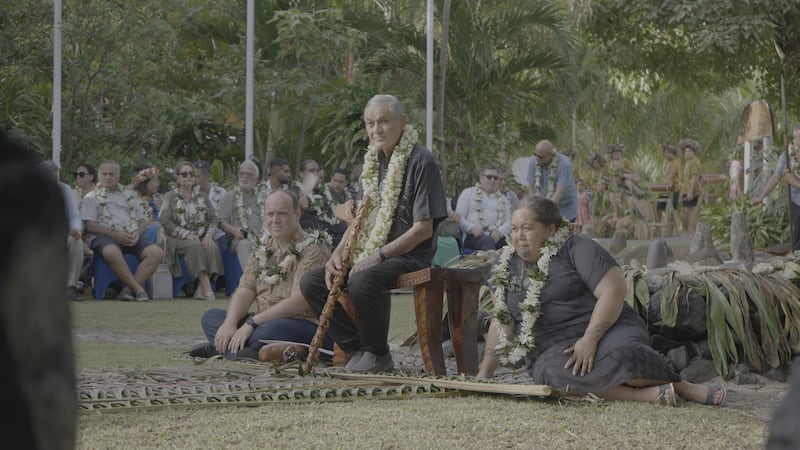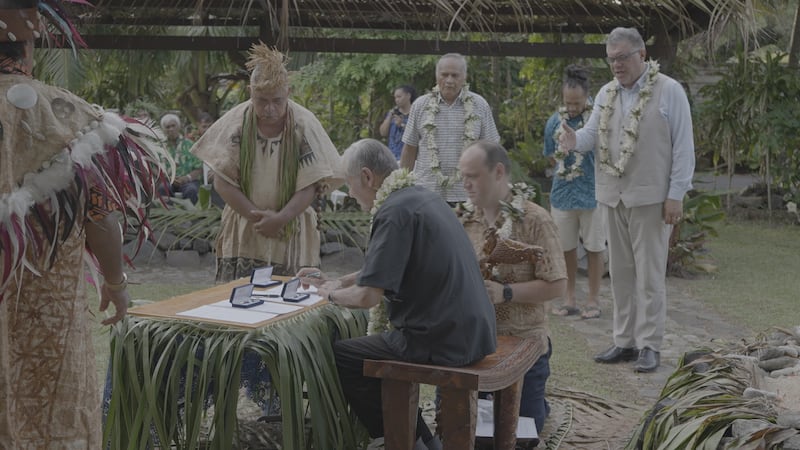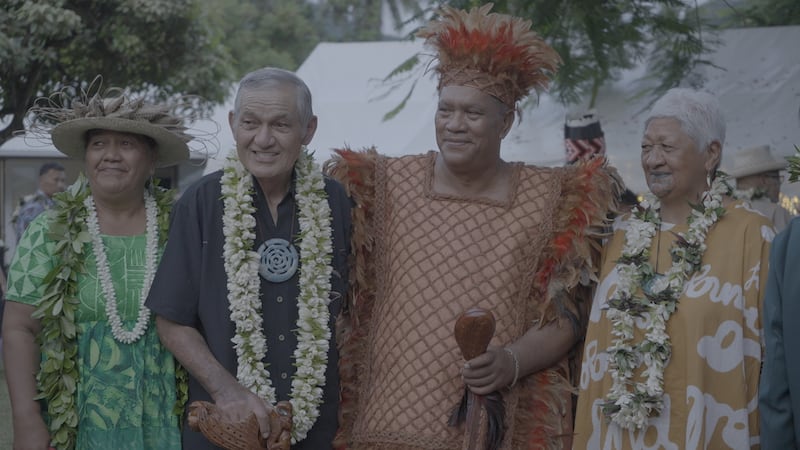Pacific indigenous leaders, including the Māori King, today urged the legal recognition of whales as persons with inherent rights.
Māori leaders spearheading the Hinemoana Halo Ocean Initiative joined forces with Kiingi Tuheitia Pōtatau Te Wherowhero VII and the Kaumaiti Nui Travel Tou Ariki of the Cook Islands to endorse He Whakaputanga Moana (Declaration for the Ocean). They launched their endorsement at Atupare Marae, House of Ariki Estate, Rarotonga, Cook Islands.

“The songs of our ancestor, the tohorā (whale), who have navigated these very waters for generations, grow fainter,” Kiingi Tuheitia said.
“He Whakaputanga Moana is not merely words on paper. It’s a Hinemoana Halo, a woven cloak of protection for our taonga, our treasures – the magnificent whales.”
“Ultimately, He Whakaputanga Moana is a declaration for future generations. Our mokopuna (descendants) deserve to inherit an ocean teeming with life, where the songs of whales continue to resonate across the vast expanse,” he said.

“The mauri (life force) of Te Moana-nui-a-Kiwa (the Pacific Ocean) is inseparable from the well-being of whales,” Conservation International Aotearoa (New Zealand) vice-president Mere Takoko said.
‘Heartbeat of the ocean’
“Their songs are the very heartbeat of the ocean, and their presence reflects the strength of our own mana (spiritual essence). We have a responsibility to ensure their survival for generations to come.”
He Whakaputanga Moana draws upon the traditions of Te Ao Māori (Māori worldview) and emphasises the interconnectedness of all living things. Recognising the urgent threats whales face from unsustainable practices, pollution, and climate change, the declaration outlines a comprehensive plan for their protection.
“We propose the creation of the Hinemoana Halo Ocean Protection Fund,” Ngāti Wai leader and Māori ambassador of the initiative Aperahama Edwards said.
“This fund will empower Indigenous communities, the natural guardians of our shores, and support initiatives aligned with the declaration’s goals. Together, we can create a Hinemoana Halo, a woven cloak of protection for these taonga (treasures), our whales.”
Hinemoana Halo Ocean Fund co-chair Lisa Tumahai emphasized the collaborative spirit at the heart of the declaration.
‘Call to action’
“He Whakaputanga Moana is more than just words on paper,” she said. “It’s a call to action for all nations, for everyone who shares a love for Te Moana. Let us join hands, share knowledge, and ensure the songs of whales continue to echo across the vast expanse for our mokopuna (descendants).”
He Whakaputanga Moana aims to establish marine protected areas and implement dynamic rāhui (customary restrictions guided by ancestral wisdom) are crucial steps. The declaration also advocates for weaving together mātauranga Māori (Indigenous knowledge) with science for a more holistic approach to whale protection. The declaration emphasises the crucial role of Polynesian communities and fosters regional collaboration for whale conservation.
“We can no longer turn a blind eye,” said the Kaumaiti Nui of the Cook Islands. “Whales play a vital role in the health of our entire ocean ecosystem. Their decline disrupts the delicate balance that sustains all life in Te Moananui-a-Kiwa. We must act with urgency to protect these magnificent creatures before it’s too late.”




